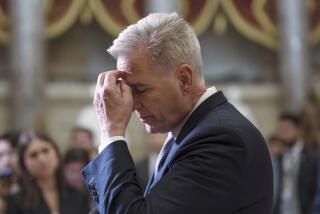Republicans still firmly against raising debt ceiling without big cuts
Reporting from Washington — Two top Republicans said Sunday they opposed raising the nation’s debt ceiling without major moves to slash the federal deficit, a stance that suggests the GOP may be heading toward a high-stakes showdown with Democrats as the deadline for congressional action nears.
Senate Minority Leader Mitch McConnell (R-Ky.) said on NBC’s “Meet the Press” that he was prepared to keep the ceiling in place “unless we do something really significant about debt and deficit.”
Former Minnesota Gov. Tim Pawlenty, a Republican candidate for president, also challenged the Obama administration’s contention that failure to lift the debt limit would trigger an unprecedented default.
The U.S. has until Aug. 2 to raise the $14.3-trillion debt ceiling, said Treasury Secretary Timothy F. Geithner. Failing to act would invite “catastrophic” consequences, Geithner has said: Military service members would not get paid, retirement investments would drop in value, and people would face higher payments on mortgages and car loans.
President Obama has said he expects Congress to increase the ceiling. In an interview last month with the Associated Press, the president said: “We will raise the debt limit. We always have. We will do it again.”
The alternative, Obama said, is to “plunge the world economy back into a recession.”
Posturing is always a part of congressional negotiations, but Republicans are under enormous pressure from “tea party” conservatives to curtail spending. The debt ceiling debate presents some congressional Republicans with an unhappy choice: A vote to raise the ceiling might expose them to primary challenges in the 2012 election, while a vote against it risks a default on U.S. debt obligations that could jeopardize the fragile economic recovery.
Pawlenty, in an interview with ABC’s “This Week,” said the consequences of failing to raise the cap might not be as stark as the White House contends.
Asked whether the result would prove calamitous for the U.S. economy, Pawlenty said: “Well, there are some serious voices challenging that very premise. And the answer is nobody really knows, because we’ve not been at this point before.”
If opponents hold their ground and keep the ceiling intact, the U.S. could still manage by prioritizing payments, using the remaining cash to pay outside creditors first, Pawlenty said.
The Obama administration has dismissed that approach as “unworkable.” In a blog post this year, Deputy Treasury Secretary Neal Wolin wrote that giving certain creditors privileged status was “default by another name.”
“Such a policy would also be unacceptable to American servicemen and women, retirees and all other Americans who would rightly reject the notion that their payment has been deemed a lower priority by their government,” Wolin wrote.
But a compromise might be in the offing. McConnell, in his appearance on “Meet the Press,” left open the possibility of a deal.
Obama has said he is amenable to additional spending cuts as a condition of lifting the debt ceiling.
In the end, the markets could bridge the divide.
Peter R. Orszag, Obama’s former budget director, predicted in a speech last week that the impasse may soon cause bond market fluctuations that demonstrate the real cost of inaction.
“We are going to deal with the problem when we have significant external pressure to do so,” said Orszag, who is now vice chairman for global banking at Citigroup.
More to Read
Sign up for Essential California
The most important California stories and recommendations in your inbox every morning.
You may occasionally receive promotional content from the Los Angeles Times.










